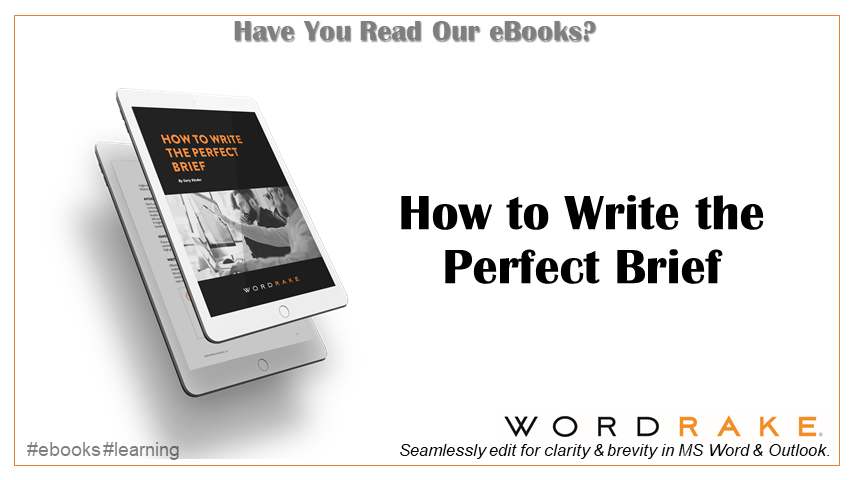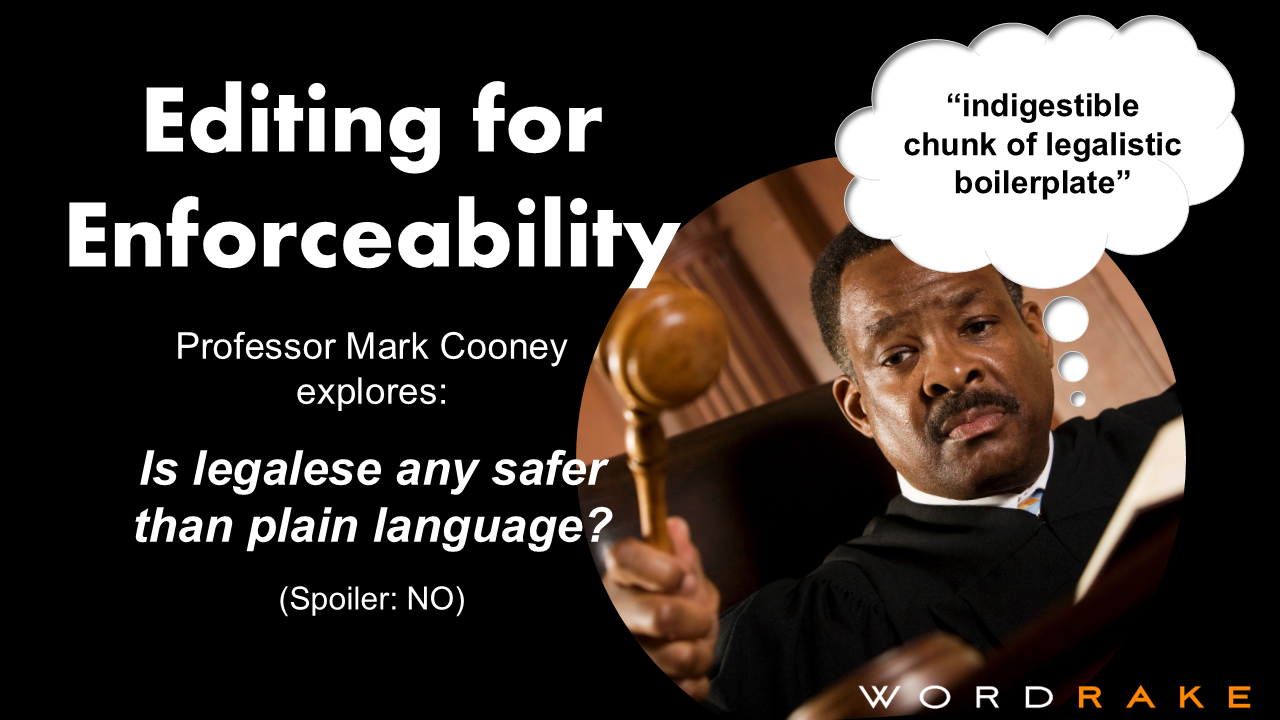If you listen to outsiders and many practicing lawyers, you may believe that legal writing is just a task to get through as quickly as possible. You may even believe that oral argument is the real lawyering.
To confront those assumptions, Professor Diana Simon and I wrote a book to prove that writing quality does influence the outcome of real cases. And what better way to prove it than to put a legal-writing spin on the vaunted casebook method? I’ll share some of the lessons from The Case for Effective Legal Writing with you here.
Failing Grades
Each case featured in the book is a cautionary tale about the risks of taking style and mechanics for granted. And some of the opinions were downright scathing. The Seventh Circuit, after criticizing three sections of an attorney’s brief, called the rest “similarly wretched.”[1] In a later case, the same court quipped that “[b]ad writing does not normally warrant sanctions, but we draw the line at gibberish.”[2]
Other judges—channeling their inner law professors—gave resounding Fs to ineffective attorney–authors:
-
“Presumably the transaction documents were drafted by lawyers. . . . [I]f those lawyers had been law students and submitted these documents as a final exercise in a Pass/Fail course on Clarity in Legal Writing, their grade would not begin with a ‘P.’”[3]
-
A “first-year law student who submitted this ‘response’ for a legal writing class would likely be encouraged to rethink his or her choice of career. To receive such a grossly incompetent effort from a practicing lawyer is appalling.”[4]
Courts have lamented everything from missing apostrophes to the inconsistent use of singulars and plurals—sometimes all at once:
With callous disregard for the reader, plaintiffs’ counsel has done nothing to minimize the confusion . . . . Despite the presence of two plaintiffs and four defendants, the terms ‘plaintiff’ and ‘defendant’ are often used in the singular, leaving the reader to puzzle out which plaintiff or which defendant is referred to. . . . And the list could go on—counsel uses possessives without apostrophes, leaving the reader to guess whether he intends a singular or plural possessive. Such sloppy pleading and briefing are inexcusable . . . .[5]
One federal judge was especially candid about a complaint’s incoherent meanderings:
[Rule 8’s] ‘short and plain statement’ command is not served by page-long sentences permeated with broken clauses and cross-references. Subjects, for that matter, should not have to forage for a verb.[6]
The judge ordered “corrective action” to improve passages that were “needlessly verbose, tangled, fractured, and repetitive.”[7] And he offered specific instructions: “Counsel should focus on breaking long sentences down into multiple sentences and pruning excessive references in each paragraph.”
The judge’s final message was figurative yet unmistakable: “Plaintiffs must fashion a well-marked path through the complexity jungle.”
Case Dismissed
The consequences of poor style can be more serious than jibes from exasperated judges. Courts have dismissed civil complaints that were
-
“disjointed, unclear, and prolix”[8];
-
unduly verbose and plagued by “unintelligibility”[9];
-
“next to impossible” to decipher because of verbosity; grammar, punctuation, and spelling errors; and many 100-plus word sentences, including sentences of 291, 345, and 385 words;[10]
-
plagued by paragraphs that were “long, confusing, redundant, and full of run-on sentences that mix[ed] factual allegations with editorial asides.”[11]
In some of these cases, the courts (having already allowed amendments) lost their patience: dismissal was with prejudice.
Courts have also dismissed appeals—even declared them frivolous—because of a lawyer’s failure to provide a “cogent analysis”[12] or filing of an “incoherent” and “almost unintelligible” brief.[13]
The Ethics of Clear Writing
Some of our selected cases confirmed what most lawyers already know: substandard writing implicates an attorney’s professional standing. Courts across the country have upheld disciplinary measures against lawyers whose writing was grossly deficient (especially when accompanied by other misconduct).
The Second Circuit upheld a two-year suspension of an attorney who filed appellate briefs of “shockingly poor quality.”[14] The briefs got client names wrong, contained irrelevant boilerplate, and, in some places, were simply unintelligible.[15]
The Utah Supreme Court affirmed a trial court’s decision to disbar an attorney based on, among other improper actions, her filing of “incomprehensible pleadings and memoranda.”[16]
The Kentucky Supreme Court upheld a 60-day suspension of a lawyer whose pleading was “‘little more than fifteen unclear and ungrammatical sentences, slapped together as two pages of unedited text with an unintelligible message.’”[17] The court added that the brief “would compare unfavorably with the majority of the handwritten pro se pleadings prepared by laypersons which this Court reviews on a daily basis.”[18]
And the Vermont Supreme Court suspended a lawyer because he’d written “inadequate and incomprehensible legal briefs.”[19] The lawyer had previously agreed to get writing lessons and submit a ten-page writing sample, but he didn’t complete his tutorial.[20]
This is just a quick taste of cases showing the perils of poor legal writing. Professor Simon and I found enough cases to fill a book, yet even our book-length sampling couldn’t include every apt case. We focused on relatively recent cases—and cases of special interest. But whatever the subject or vintage, those court opinions, and others like them, show that reputations, arguments, and lawsuits can buckle under the weight of sloppy writing.
About Mark Cooney
Mark Cooney chairs the writing department at Thomas M. Cooley Law School. He was Editor in Chief of The Scribes Journal of Legal Writing for six volumes and now serves as a Senior Editor. He is author of Sketches on Legal Style (Carolina Academic Press 2013) and coauthor of The Case for Effective Legal Writing (Carolina Academic Press 2024). He has published more than 50 articles or book chapters on legal writing and other topics. His works have appeared in The Green Bag, Legal Communication & Rhetoric: JALWD, the Scribes Journal, and elsewhere, and have been quoted and cited by state and federal courts.
[1] Sambrano v. Mabus, 663 F.3d 879, 881 (7th Cir. 2011).
[2] McCurry v. Kenco Logistics Servs., LLC, 942 F.3d 783, 791–92 (7th Cir. 2019).
[3] Band of N.Y. v. First Millennium, Inc., 598 F. Supp. 2d 550, 568 (S.D.N.Y. 2009), aff’d 607 F.3d 905 (2d Cir. 2010).
[4] Butler-Rance v. Providian Bancorp Servs., Inc., 2007 WL 2310114, at *2 (M.D. Fla. Aug. 9, 2007).
[5] P.M.F. Servs., Inc. v. Grady, 681 F. Supp. 549, 550 n.1 (N.D. Ill. 1988).
[6] Ramos-Barrientos v. Bland, 2008 WL 474426, at *2 (S.D. Ga. Feb. 19, 2008).
[7] Id.
[8] Hunt v. Caliber Home Loans, Inc., 2018 WL 10799004, at *2 (S.D. Fla. Mar. 6, 2018).
[9] Eberhardt v. Village of Tinley Park, 2020 WL 10618313, at *1 (N.D. Ill. Oct. 14, 2020).
[10] Stanard v. Nygren, 658 F.3d 792, 799–800 (7th Cir. 2011).
[11] Doe v. Univ. of Iowa, 2022 WL 4182196, at *3 (S.D. Iowa Sept. 2, 2022).
[12] Farr v. State, 665 S.W.3d 394, 400 (Mo. Ct. App. 2023).
[13] Sambrano v. Mabus, 663 F.3d 879, 881 (7th Cir. 2011).
[14] In re Sobolevsky, 430 Fed. Appx. 9, 9 (2d Cir. 2011).
[15] Id. at 17.
[16] Rose v. Office of Professional Conduct, 424 P.3d 134, 136-38 (Utah 2017).
[17] Kentucky Bar Ass’n v. Brown, 14 S.W.3d 916, 918–19 (Ky. 2000) (quoting the Kentucky Bar Association).
[18] Id. at 919.
[19] In re Shepperson, 674 A.2d 1273, 1274–75 (Vt. 1996).
[20] Id. at 1273–74.








